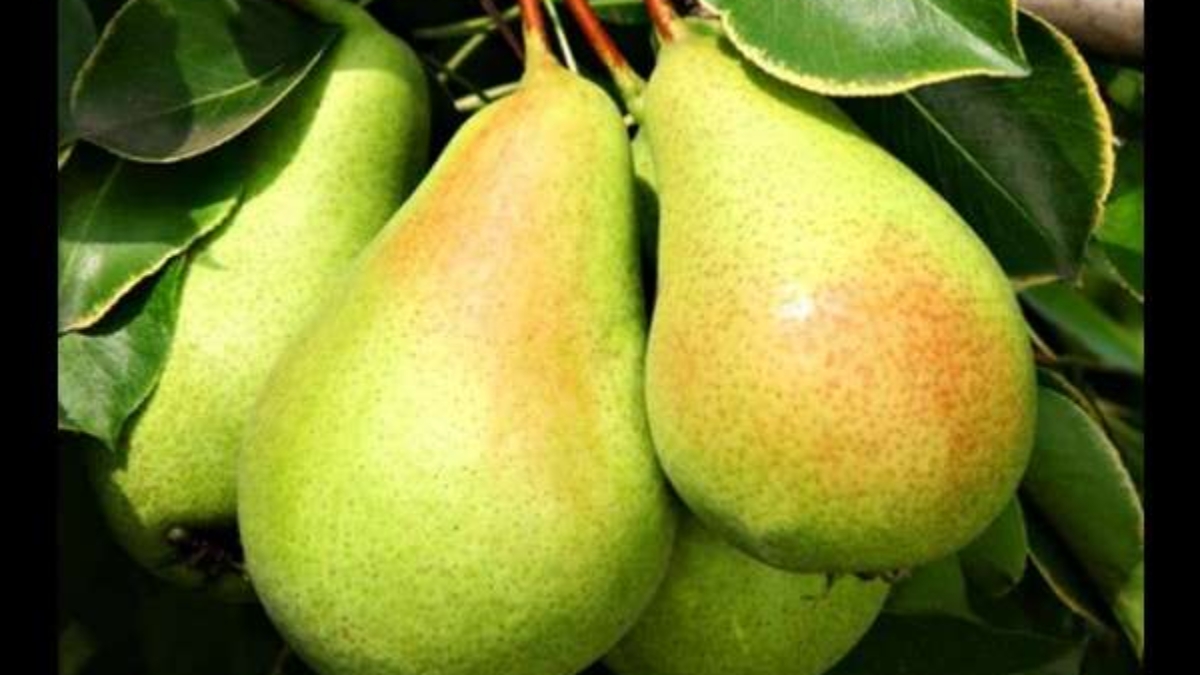The Indian pear, commonly known as Babugosha in India, is a variety of pear that is widely grown and consumed in India. It is part of the Rosaceae family, similar to apples, and is known for its juicy, sweet, and slightly grainy texture.
The fruit typically has a greenish-yellow skin that sometimes develops a light blush when ripe. It has numerous health benefits.
Key Characteristics of the Indian Pear (Babugosha):
- Shape and Size: Indian pears are usually small to medium in size with a classic pear shape—round at the bottom and tapering towards the top.
- Texture and Flavor: The flesh of the Babugosha is soft, juicy, and slightly grainy, with a sweet flavor that can sometimes have a mild tartness. The texture is more delicate compared to Western varieties of pears.
- Season: Babugosha is typically harvested in the late summer to early autumn. It is widely available in Indian markets during this season.
- Nutritional Value: Like other pears, Babugosha is rich in dietary fiber, vitamin C, potassium, and various antioxidants, making it a nutritious addition to the diet.
- Culinary Uses: Indian pears can be eaten fresh as a snack, added to fruit salads, or used in desserts. They are also sometimes used in making juices, jams, and preserves.
Why It’s Popular:
Babugosha is favored for its sweetness, juiciness, and health benefits, making it a popular fruit choice across India. It’s a refreshing fruit, especially during the hot months, and is enjoyed by people of all ages.

Health Benefits of the Indian Pear (Babugosha)
Here are numerous health benefits of India Pear…
- Rich in Dietary Fiber: Indian pears are an excellent source of dietary fiber, which aids digestion, prevents constipation, and promotes a healthy gut. The fiber also helps in maintaining a healthy weight by making you feel full for longer.
- Supports Heart Health: The high fiber content in pears helps lower cholesterol levels, reducing the risk of heart disease. Additionally, they contain potassium, which helps regulate blood pressure and supports overall cardiovascular health.
- Packed with Antioxidants: Indian pears are rich in antioxidants like vitamin C and flavonoids, which protect cells from damage caused by free radicals. This can lower the risk of chronic diseases, including cancer.
- Boosts Immune System: The vitamin C in Indian pears strengthens the immune system, helping the body fight off infections and illnesses more effectively.
- Aids in Weight Management: Low in calories and high in water content, Indian pears are a great snack for those looking to manage their weight. They provide a satisfying crunch without adding too many calories.
- Promotes Skin Health: The antioxidants and vitamins in pears contribute to healthy, glowing skin. Vitamin C, in particular, helps in collagen production, which is vital for maintaining skin elasticity and reducing wrinkles.
- Improves Bone Health: Pears contain small amounts of calcium and vitamin K, both of which are essential for maintaining strong bones and preventing osteoporosis.
- Regulates Blood Sugar Levels: The low glycemic index of pears means they release sugar slowly into the bloodstream, making them a good fruit choice for people with diabetes or those looking to manage their blood sugar levels.
- Hydration: Being high in water content, Indian pears help keep you hydrated, especially during hot weather. Proper hydration is essential for overall health, including kidney function and skin hydration.
Easy to Digest: Pears are gentle on the stomach and easy to digest, making them suitable for people with digestive issues or those recovering from illness.
Here’s a detailed breakdown of the nutritional value of Indian pears (per 100 grams):
Nutritional Value of Indian Pears (Per 100 Grams)
Calories:
- 57 kcal

Macronutrients:
- Carbohydrates: 15 grams
- Sugars: 10 grams
- Dietary Fiber: 3.1 grams
- Protein: 0.4 grams
- Fat: 0.1 grams
Vitamins:
- Vitamin C: 4.3 mg (7% of the daily value)
- Vitamin K: 4.4 µg (5% of the daily value)
- Vitamin A: 25 IU
- Folate (Vitamin B9): 7 µg
- Riboflavin (Vitamin B2): 0.03 mg
- Niacin (Vitamin B3): 0.1 mg
Minerals:
- Potassium: 119 mg (3% of the daily value)
- Calcium: 9 mg
- Magnesium: 7 mg
- Phosphorus: 12 mg
- Iron: 0.2 mg
- Zinc: 0.1 mg
Water Content:
84% water, making it highly hydrating.
Health Highlights:
- High in Fiber: Supports digestive health and helps in weight management.
- Rich in Antioxidants: Vitamin C and Vitamin K help fight oxidative stress and support skin and immune health.
- Good for Heart Health: Potassium and fiber contribute to heart health by regulating blood pressure and lowering cholesterol levels.
Disclaimer: This article is for general information only. It cannot in any way be a substitute for any medicine or treatment. Always consult your doctor for more information.

Add a Comment